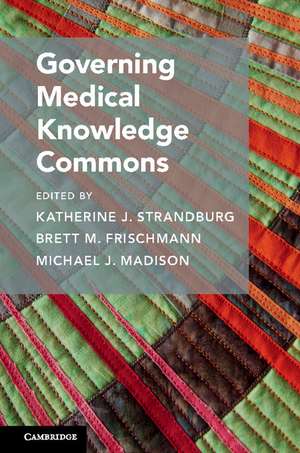Governing Medical Knowledge Commons: Cambridge Studies on Governing Knowledge Commons
Editat de Katherine J. Strandburg, Brett M. Frischmann, Michael J. Madisonen Limba Engleză Hardback – 18 oct 2017
| Toate formatele și edițiile | Preț | Express |
|---|---|---|
| Paperback (1) | 349.87 lei 6-8 săpt. | |
| Cambridge University Press – 11 oct 2017 | 349.87 lei 6-8 săpt. | |
| Hardback (1) | 585.72 lei 6-8 săpt. | |
| Cambridge University Press – 18 oct 2017 | 585.72 lei 6-8 săpt. |
Preț: 585.72 lei
Preț vechi: 658.12 lei
-11% Nou
Puncte Express: 879
Preț estimativ în valută:
112.07€ • 117.03$ • 92.55£
112.07€ • 117.03$ • 92.55£
Carte tipărită la comandă
Livrare economică 15-29 aprilie
Preluare comenzi: 021 569.72.76
Specificații
ISBN-13: 9781107146877
ISBN-10: 1107146879
Pagini: 436
Ilustrații: 38 b/w illus. 14 tables
Dimensiuni: 158 x 237 x 30 mm
Greutate: 0.75 kg
Editura: Cambridge University Press
Colecția Cambridge University Press
Seria Cambridge Studies on Governing Knowledge Commons
Locul publicării:New York, United States
ISBN-10: 1107146879
Pagini: 436
Ilustrații: 38 b/w illus. 14 tables
Dimensiuni: 158 x 237 x 30 mm
Greutate: 0.75 kg
Editura: Cambridge University Press
Colecția Cambridge University Press
Seria Cambridge Studies on Governing Knowledge Commons
Locul publicării:New York, United States
Cuprins
1. The knowledge commons framework Brett Frischmann, Michael Madison and Katherine Strandburg; 2. Leviathan in the commons: biomedical data and the state Jorge Contreras; 3. Centralization, fragmentation, and replication in the genomic data commons Peter Lee; 4. Genomic data commons Barbara J. Evans; 5. Population biobanks' governance: a case study of knowledge commons Andrea Boggio; 6. The Sentinel Initiative as a knowledge commons Ryan Abbott; 7. Cancer: from a kingdom to a commons Michael Mattioli; 8. The greatest generational impact: the open neuroscience movement as an emerging knowledge commons Maja Larson and Margaret Chon; 9. Better to give than to receive: an uncommon commons in synthetic biology Andrew W. Torrance; 10. Governance of biomedical research commons to advance clinical translation: lessons from the mouse model community Tania Bubela, Rhiannon Adams, Shubha Chandrasekharan, Amrita Mishra and Songyan Liu; 11. Constructing interdisciplinary collaboration: the Oncofertility Consortium as an emerging knowledge commons Laura G. Pedraza-Fariña; 12. The application of user innovation and knowledge commons governance to mental health intervention Glenn Saxe and Mary Acri; 13. Challenges and opportunities in developing and sharing solutions by patients and caregivers: the story of a knowledge commons for the patient innovation project Pedro Oliveira, Leid Zejnilović and Helena Canhão; 14. Chronic disease, new thinking and outlaw innovation: patients on the edge in the knowledge commons Stephen Flowers; 15. The North American Mitochondrial Disease Consortium: a developing knowledge commons Katherine J. Strandburg and Brett M. Frischmann; 16. The Consortium of Eosinophilic Gastrointestinal Disease Researchers (CEGIR): an emerging knowledge commons Katherine J. Strandburg and Stefan Bechtold.
Recenzii
'Governing Medical Knowledge Commons is a very interesting and useful book, and I am delighted to say so! Innovation development is increasingly becoming open and distributed over time. Whether and how the fruits of this openly revealed activity can be collected and efficiently utilized as a commons is a very important next question. Strandburg, Frischmann, and Madison greatly help further progress via this collection of very thoughtful studies on pioneering medical commons models and trials.' Eric von Hippel, T. Wilson Professor in Management, Sloan School of Management, Massachusetts Institute of Technology
'This volume builds on Elinor Ostrom's research on the commons. Understanding the institutions that promote cooperation is critical to good governance and improving social welfare. The authors in this volume provide case studies of governance in the medical commons. The insights are pathbreaking and will lead to better policies for medical research. Moreover, the insights here will be synergistic to research in other areas of governance of commons.' Lee J. Alston, Director of the Ostrom Workshop, Indiana University, Bloomington
'This book makes significant advances on a decades-long research agenda through which Elinor Ostrom and other commons researchers uncovered the reasons behind the often surprising success of community-based management of natural resources. Contributors to this volume demonstrate that their concept of 'commons as a mode of governance' goes well beyond standard protections for intellectual property rights to integrate collaborative practice into the very heart of innovation in medical research and treatment. Case studies detail several impressive and diverse examples of this powerful synthesis of research and practice, and the editors conclude with practical lessons for how we might achieve comparable levels of improvement in other areas.' Michael D. McGinnis, Associate Dean, College of Arts and Sciences, and former Director, Ostrom Workshop, Indiana University, Bloomington
'This volume builds on Elinor Ostrom's research on the commons. Understanding the institutions that promote cooperation is critical to good governance and improving social welfare. The authors in this volume provide case studies of governance in the medical commons. The insights are pathbreaking and will lead to better policies for medical research. Moreover, the insights here will be synergistic to research in other areas of governance of commons.' Lee J. Alston, Director of the Ostrom Workshop, Indiana University, Bloomington
'This book makes significant advances on a decades-long research agenda through which Elinor Ostrom and other commons researchers uncovered the reasons behind the often surprising success of community-based management of natural resources. Contributors to this volume demonstrate that their concept of 'commons as a mode of governance' goes well beyond standard protections for intellectual property rights to integrate collaborative practice into the very heart of innovation in medical research and treatment. Case studies detail several impressive and diverse examples of this powerful synthesis of research and practice, and the editors conclude with practical lessons for how we might achieve comparable levels of improvement in other areas.' Michael D. McGinnis, Associate Dean, College of Arts and Sciences, and former Director, Ostrom Workshop, Indiana University, Bloomington
Descriere
This book collects fifteen new case studies documenting successful knowledge and information sharing commons institutions for medical and health sciences innovation. Also available as Open Access.














